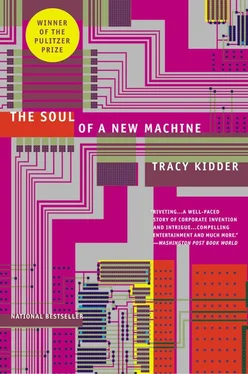In the fall of 1980 the Eclipse Group was disbanded and its members dispersed into several new and smaller groups. Some of the old crew mourned the team’s passing. One said, angrily: “It was a group that was formed and achieved this remarkable thing for the company, and the company has deemed to reward that group by blowing it up. It’s really sad.” Many others, however, shrugged. They felt that the group’s demise had been inevitable, on the one hand, and that it wasn’t really dead on the other.
After the reorganization, Ed Rasala decided to leave Data General, and although the authorities tried hard to keep him, he finally did get away. He joined Alsing out west in California. West’s chosen heir, Rasala was the last of the old group’s managers to leave the team, and so his going had the status of a milestone.
West stayed with the company. He had never imagined that the rule of pinball would be a lie for his loyal lieutenants, and he had dreamed of the group perpetuating itself. It took him a while, but eventually he seemed to find for himself a workable attitude toward the departures of his friends and the team’s demise. “Yeah, it’s all blown apart, but the ethic’s still in place,” he said. “In some sense spreading that around may be beneficial.”
West added: “It was a summer romance. But that’s all right. Summer romances are some of the best things that ever happen.”
Long before it disbanded formally, the Eclipse Group, in order to assist the company in applying for patents on the new machine, had gathered and had tried to figure out which engineers had contributed to Eagle’s patentable features. Some who attended found those meetings painful. There was bickering. Harsh words were occasionally exchanged. Alsing, who during the project had set aside the shield of technical command, came in for some abuse—Why should his name go on any patents, what had he done? Someone even asked that question regarding West. Ironically, perhaps, those meetings illustrated that the building of Eagle really did constitute a collective effort, for now that they had finished, they themselves were having a hard time agreeing on what each individual had contributed. But, clearly, the team was losing its glue. “It has no function anymore. It’s like an afterbirth,” said one old hand after the last of the patent meetings.
Shortly after those meetings, Wallach, Alsing, Rasala and West received telegrams of congratulations from North Carolina’s leader. That was a classy gesture, all agreed. The next day Eagle finally went out the company’s door.
In New York City, in the faded elegance of the Roosevelt Hotel, under gilded chandeliers, on April 29, 1980, Data General announced Eagle to the world. On days immediately following, in other parts of the country and in Canada and Europe, the machine was presented to salesmen and customers, and some members of the Eclipse Group went off on so-called road shows. About a dozen of the team attended the big event in New York. There was a slick slide show. There were speeches. Then there was an impressive display in a dining hall—128 terminals hooked up to a single Eagle. The machine crashed during this part of the program, but no one except the company engineers noticed, the problem was corrected so quickly and deftly. Eagle—this one consisted of the boards from Gollum—looked rather fine in skins of off-white and blue, but also unfamiliar.
A surprisingly large number of reporters attended, and the next day Eagle’s debut was written up at some length in both the Wall Street Journal and the financial pages of the New York Times . But it wasn’t called Eagle anymore. Marketing had rechristened it the Eclipse MV/8000. This also took some getting used to.
The people who described the machine to the press had never, of course, had anything to do with making it. Alsing—who was at the premiere and who had seen Marketing present machines before, ones he’d worked on directly—said: “After Marketing gets through, you go home and say to yourself, ‘Wow! Did I do that?’ ” And in front of the press, people who had not even been around when Eagle was conceived were described as having had responsibility for it. All of that was to be expected—just normal flak and protocol.
As for the machine’s actual inventors—the engineers—most who came seemed to have a good time, although some did seem to me a little out of place, untutored in this sort of performance. Many of them had bought new suits for the occasion. After the show, there were cocktails and then lunch, and during this time most of the engineers stuck together, like young men at a dance. At lunch, they occupied a table all their own. It was a rather formal luncheon, and there was some confusion at their table as to whether it was proper to take first the plate of salad on the right or the one on the left.
West came, too. He did not sit with his old team, but he did talk easily and pleasantly with many of them during the day. “I had a great talk with West!” remarked one of the Microkids.
He wore a brown suit, conservatively tailored. He looked as though he’d been wearing a suit all his life. He had come to this ceremony with some reluctance, and he was decidedly in the background. At the door to the show, where name tags were handed out, West had been asked what his title was. “ ‘Business Development,’ ” he’d said. At the cocktail party after the formal presentation, a reporter came up to him: “You seem to know something about this machine. What did you have to do with it?” West mumbled something, waving a hand, and changed the subject. Alsing overheard this exchange. It offended his sense of reality. He couldn’t let the matter stand there. So he took the reporter aside and told him, “That guy was the leader of the whole thing.”
I had the feeling that West was just going through motions and was not really present at all. When it was over and we were strolling down a busy street toward Penn Station, his mood altered. Suddenly there was no longer a feeling of forbidden subjects, as there had been around him for many months. I found myself all of a sudden saying to him: “It’s just a computer. It’s really a small thing in the world, you know.”
West smiled, softly. “I know it.” None of it, he said later, had come out the way he had imagined it would, but it was over and he was glad.
The day after the formal announcement, Data General’s famous sales force had been introduced to the computer in New York and elsewhere. At the end of the presentation for the sales personnel in New York, the regional sales manager got up and gave his troops a pep talk.
“What motivates people?” he asked.
He answered his own question, saying, “Ego and the money to buy things that they and their families want.”
It was a different game now. Clearly, the machine no longer belonged to its makers.
Many people—in the end, there were hundreds—worked on the project that this book describes. I could not name them all in the text, nor does it seem just to attempt to name them in this note, for undoubtedly I would miss someone. I have not even been able to name all of the hardware engineers who participated. Several made important contributions and are not mentioned. Others who also did a great deal of the work are awarded only a small amount of space in the narrative. To all, I offer my regrets, and I hope that they do not share them. In any case, no one who reads this book should imagine that its characters make up a complete cast.
My thanks to all my friends and acquaintances in the world of computers, and to Susan T. and Muffet for help and hospitality. For their editorial assistance and encouragement, my thanks to Upton Brady, Peter Davison, Robert Manning, Sue Parilla and Michael Brandon. Thanks for general all-around help to Maureen Brown, Avril Cornel, Nina Engelhardt, Louise Desaulniers, Natalie Greenberg and Martha Spaulding; and for special assistance, to Paul Rich. Thanks for listening, to Stuart Dybek, Jon A. Jackson and Mike Rosenthal; and for their excellent, timely counsel, thanks to Messrs. Rob Duggan, George Hall, Greg Pilkington, Ike Williams and Tim Rivinus; and for painstaking work on my behalf, my thanks to Mark Kramer. And many thanks, of course, for all of the above and more, to my parents and to Fran.











